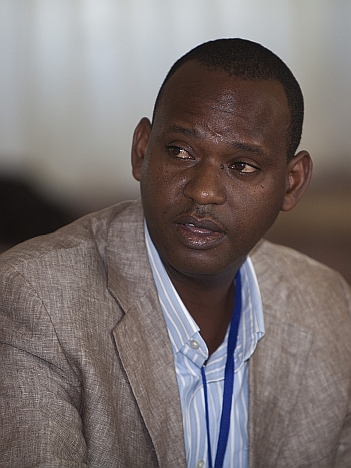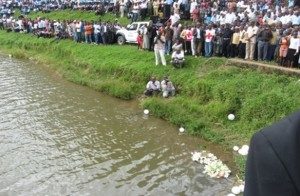
Speech delivered by Alex Mugabo, Programme Manager of Survivors Fund (SURF Rwanda) on AVEGA’s 15th Annual National Congress.
On behalf of AVEGA’s partners, and on behalf of Survivors Fund, I greet you all.
From the outset, let me begin by thanking the management of AVEGA for having invited us to this congress but most importantly for having chosen SURF to speak on behalf of all other partners on this occasion.
I believe this was not just a matter coincidence, but rather by design owing to the strong and robust partnership between the two organizations.
However, as I have just mentioned, I am here to speak on behalf of all other AVEGA partners.
Nonetheless, for the benefit of those who don’t know who SURF are, allow me to spend just a few minutes and speak about my organization.
SURF is a British charity organization registered in England and the Wales, established by a Rwandan lady, Mary Kayitesi Blewitt in 1995 immediately after the aftermath of the 1994 genocide against the Tutsi.
SURF develops and delivers holistic programs ranging from healthcare to house building, education to entrepreneurship, legal redress to livelihoods development, and trauma counseling just to mention a few through survivor-led organizations such as AVEGA. However, over time its program interventions have evolved to match with present day challenges of genocide survivors.
SURF has since its inception partnered with survivor-led organizations to respond to the plight of genocide survivors. Particularly, SURF has had a rare privilege to partner with AVEGA since 1996 and, to this day the partnership has been growing strong.
Let me stress here that SURF could possibly be the only international organization in Rwanda delivering tailored interventions towards the plight of genocide survivors. We are therefore more than happy to play that role and particularly in partnership with AVEGA.
I won’t dwell much on what SURF does in partnership with AVEGA or other survivor organizations, so let me speak about today’s congress.
First of all, on behalf of the partners allow me to thank AVEGA again for bringing together its members, government organs, partners, but most importantly some of its beneficiaries at various levels – be it at the sector, district, province and national level through its annual congress.
If I am not mistaken, AVEGA could possibly be the only organization in Rwanda that convenes such congress meetings at all these levels.
It is through such gatherings that AVEGA becomes accountable to its members as well as partners, but at the same time a forum for taking stock of and brainstorming on achievements over the last year while forging a way forward for the year ahead.
In that regard therefore, allow me on behalf of partners to give our modest contributions towards this congress.
First and foremost, is to reiterate the purpose for which AVEGA as an organization was created way back in 1995. In our view, the purpose for your existence is as significant today as it was eighteen years ago.
Across the whole country, we still witness the need for your interventions such as for:
– Vulnerable elderly widows above 70 years of age
– Lone widows without anyone to support them
– Widows without shelter and those in dilapidated houses
– Widows who cannot afford the health insurance – mutuelle de santé
– Widows who are extremely sick notably from HIV and AIDS, cancer, those severely traumatized, and the mentally sick
– Widows who cannot write or read
– Widows who are slowly but steadily succumbing to death from curable diseases for lack of proper treatment
– Mothers who were raped and the children born to them
– Widows who still need legal redress especially with respect to land registration, Gacaca court awards, and property rights
– Etc, etc…
All the above examples are a clear manifestation of how your organization is still critical to the delivery of services to your members.
As it has been shown through the various reports, SURF and partners appreciate the various services AVEGA has and still continues to deliver to its beneficiaries albeit resource constraints.
At SURF, we are very proud that through our partnership with AVEGA, it has been made possible to open new offices in the Southern and Northern regions and the remaining five districts of the Western Province where AVEGA was not currently operating, and in so doing thus assuring AVEGA of a nationwide coverage of its members. When I was in Cyangugu a couple of days ago to attend their congress, I was amazed at how district representatives presented articulate reports at the congress just less than one year after the introduction of the Big Lottery Fund project – a clear demonstration of how such partnerships can create impact.
As you all might well be aware, since the 2008 global financial crisis, donor countries have been downsizing their financial support to poor countries. Consequently, SURF has tried to redefine its partnership with survivor organizations to shift from direct support to beneficiaries to now focus more on livelihoods development which is more meaningful and sustainable in the long run.
This is also in tandem with the theme for this year’s congress, that is, let’s strive to be self reliant (Duharanire Kwigira).
Through the HIV+ Survivors Integrated Project (SIP) which was piloted in the Eastern Province and Kigali city between the years 2010-2012, it was demonstrated that through such livelihood development and entrepreneurship micro-projects, widows could easily be facilitated to rebuild their lives in a more sustainable manner.
Consequently, in partnership with AVEGA we have replicated the same model in the southern, northern and western AVEGA regions through two new grants. In this model we sensitize widows to form into income generating activity groups, take them through entrepreneurship training, facilitate them to develop micro business projects, introduce them to a microfinance institution in which SURF has established a guarantee fund which then enables them to access loans, and monitor implementation of the business plans and repayment of loans.
That is why for the last couple of days SURF has engaged FARG to discuss with them possible areas of mutual collaboration regarding their entrepreneurship program. We would like to propose to FARG not to give out money in form of cash grants as that has previously been attempted but failed as beneficiaries shared out the money amongst themselves at the expense of using it productively.
This model, although cannot be afforded by all, is the only way that can guarantee long term benefits to beneficiaries.
I then would like to ask fellow partners on behalf of AVEGA to put more emphasis going forward into projects that deliver long-term and sustainable returns.
There are already vivid examples to prove this – such as the Rwamagana guest house, the canteen here at the head office and the Gicumbi guest house all of which as reported are indeed already generating positive returns. Projects such as the Busanza training facility, will no doubt go a long way in ensuring financial stability for AVEGA.
I also would like to request government through FARG to relinquish certain functions where it is established that survivor organizations can perform better those functions – through binding win-win contractual arrangements. This is what they are already doing between FARG and AVEGA in the delivery of counseling services.
This could be replicated for other programs such as those for mothers who were raped and the FARG entrepreneurship program. FARG would then release funds to these organizations, sign performance contracts with them and hold them accountable on deliverables.
This would then allow FARG to concentrate on far much more important tasks such as shelter, health, and students to mention a few.
In the same way, we would like to ask AVEGA to build synergies and strong partnerships with other survivor-led organizations in pursuit of general survivors’ interests.
For example, as I speak now, there have been ongoing discussions between these organizations on possibilities of establishing a reparation fund for survivors. Although we do acknowledge how difficult it has been to initiate these discussions, at least we must appreciate that it has been brought to the attention of government and different stakeholders.
Before I conclude, I want to remind all of us here present that, next year Rwanda and the whole world shall commemorate the 20th genocide anniversary. This shall be a very momentous period for which each of us should start thinking how we, just not celebrate the event as usual rather how going forward we tackle the remaining challenges of survivors.
To conclude, I wish to thank AVEGA again for inviting us to their 15th annual congress. At SURF we believe that it is an obligation that we have to support survivors of the genocide in Rwanda. We shall continue to do advocacy on their behalf, solicit financial support from different donors, and build capacities of the various organizations we partner with.
Thank you so much for your kind attention. God bless you.

